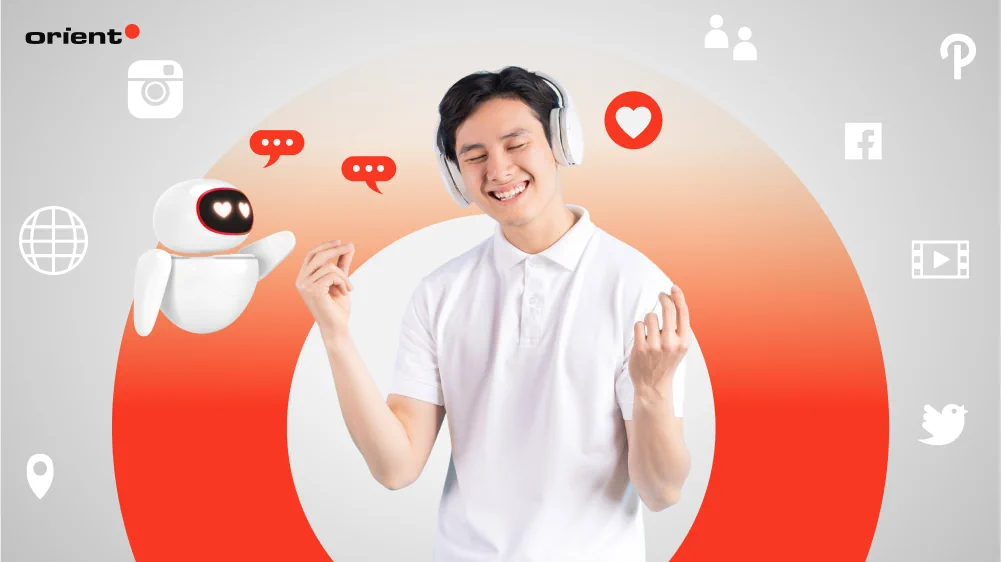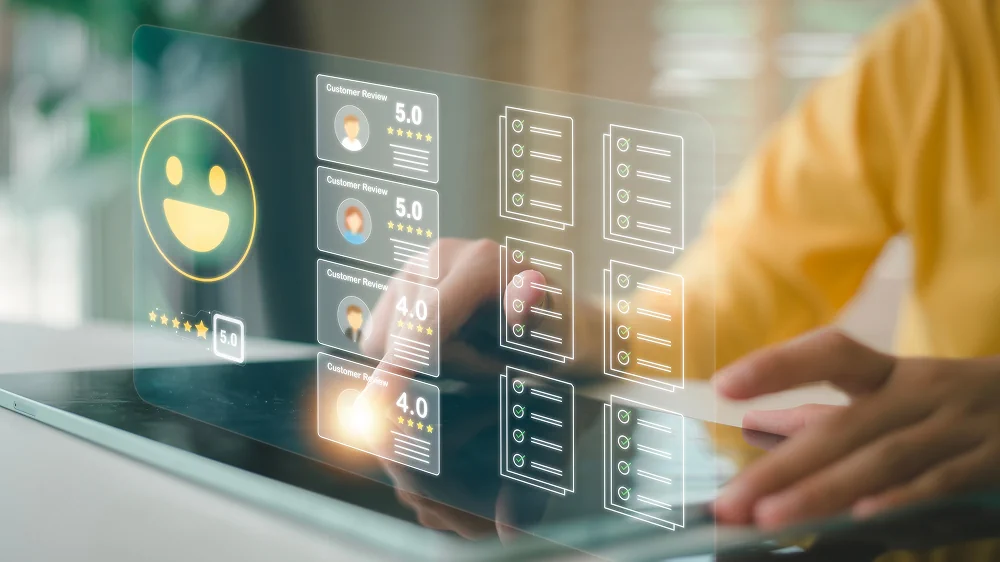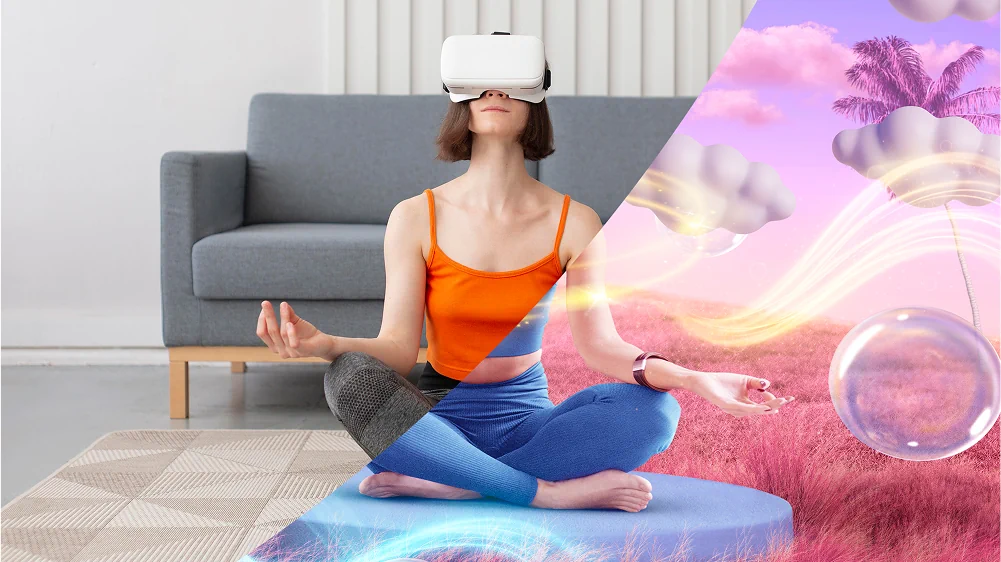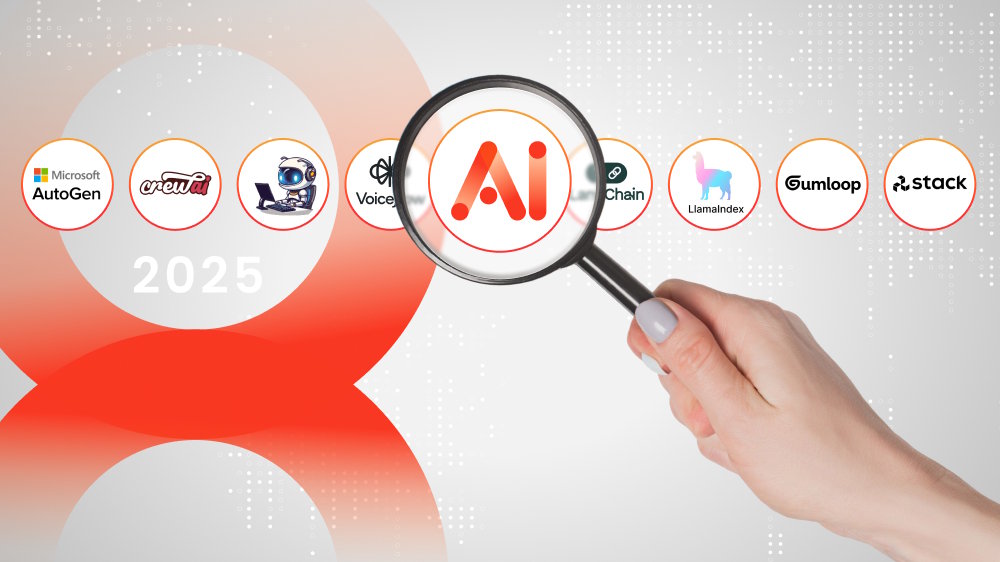
The Widespread Adoption of AI in Entertainment & Media: Is It Time for AI-Driven Creativity?
It is no surprise to see how AI tackles the domain of creativity, specifically the media and entertainment sector. Let's take a closer look at where AI is already changing the game.

Content Map
More chaptersWatching how artificial intelligence evolves at an unprecedented pace was nothing short of a staggering experience, and perhaps even a little frightening. AI has long ceased to be a futuristic concept for science fiction. It has now become mainstream technology and a daily reality, where we all use AI tools in our everyday activities to augment us in a specific field or specialty. More than that, it is thriving as a transformative force shaping our technological and human future, and soon, everything else. On what basis can we claim such confidence? The global AI adoption across continents, industries, and cultures, and the growing recognition for AI literacy speak volumes.

The utility of AI technology is not confined to automating repetitive tasks or accelerating existing workflows. Still, its true potential remains largely untapped. Yet even during its infancy, AI has already made significant inroads into the domain of creativity, specifically the media and entertainment sector. Its current impact on the creative process is best seen through specific, real-world use cases.
It is not unfounded as the global AI in the media and entertainment market was valued at $25.98 billion in 2024, and it is expected to grow to $99.48 billion by 2030, which outgrows its current size by almost four times. Would you like to see how AI actually tackles the field of creativity? Let’s unfold the fascinating ways of using AI-powered tools in the entertainment and media industry.
Key Takeaways:
In short, AI is no longer a curiosity in the creative world; it is now a practical co-creator in media and entertainment. And while it may not replace the artistic eye or narrative instinct of a seasoned professional, it’s clear that AI has earned its place alongside them: Accelerating workflows, expanding possibilities, and making creativity more inclusive than ever before.
- AI enhances creativity by accelerating ideation, automating technical workflows, and enabling personalization at scale, but it doesn’t replace the emotional intelligence or originality of human creators.
- Content creation tools powered by AI assist writers, designers, and marketers with ideation, drafting, proofreading, and repurposing content, allowing for faster, more targeted messaging.
- Predictive analytics and sentiment analysis allow brands to understand audience preferences in real time, making marketing efforts more strategic and data-driven.
- Design and video editing benefit from AI through automation, democratization, and rapid content prototyping, enabling creators at every skill level to produce high-quality visual content.
- In filmmaking, AI supports script development, VFX, deepfake simulation, and post-production processes, reducing costs and opening up new storytelling methods.
- Music production sees a blend of AI-generated composition and voice synthesis, helping professionals and amateurs create tracks with increasing realism and efficiency.
- Gaming leverages AI to build adaptive worlds, responsive NPCs, and personalized experiences. It blurs the line between player and developer.
While AI expands access to creativity and unlocks new frontiers, its role must be guided by human vision. The future belongs not to machines alone, but to creators who understand how and when to collaborate with them.
Artificial Intelligence Has Been Empowering Various Aspects of the Media and Entertainment Industry
In reality, artificial intelligence supercharges not one but multiple creative aspects. Its greatest strength is adaptability, which allows it to dynamically adjust based on the domain it is applied to and the problems it is tasked to solve. More and more media and entertainment companies are taking advantage of AI-powered tools to streamline their operations and optimize expenses in exchange for increased productivity and revenue. Moreover, many tech-driven companies and dynamic startups are increasingly building their business and marketing strategies around the evolution of AI.
Here’s how AI technologies are shaping each key area in the entertainment and media landscape:
Marketing & Advertisement
One of the first major footholds must be in marketing. The advent of generative AI has become a game-changer. Marketers and creative professionals have learn their ways to collaborate with AI to produce content of various forms, conduct audience analysis, and curate marketing campaigns that engage with their potential customers.

Content Creation
Content production is one of the very first area that witness the significant paradigm powered by generative AI tools. These tools are powered by advanced capabilities like deep learning, natural language processing, large language models, and AI algorithms. They can generate a variety of marketing assets, such as blog posts, landing pages, product descriptions, social media updates, ad copy, video scripts, and many more.
AI is now woven into every stage of modern content creation, distribution, and even audience engagement. Human writers have a plethora of AI-driven tools, such as ChatGPT, Perplexity, Jasper, Copy.ai, etc., to support them with their routine tasks. They are enabled to process vast datasets, identify key trends, and draw data-driven insights within minutes rather than hours or days. The use of AI in content creation is not confined to brainstorming or writing. Human writers can utilize tools with AI features, such as Grammarly, to not only automate routine tasks but also proofread their work and check plagiarism.
The potential of AI is limitless; however, it is not without disadvantages. Much of AI-generated content is formulaic. While AI tools can produce in bulk, they struggle with originality, depth, and emotional nuance. There needs to be a balance between speed and substance when utilizing AI for content generation. If not, you may risk flooding audiences with surface-level content and diluting true storytelling.
Even with the most powerful AI models, human writers remain the heart of storytelling and contextual messaging. AI in content creation should be treated as a collaborator, not a replacement for human emotional intelligence. In a collaborative approach, writers guide the tone, emotional nuance, and brand voice while AI fills in the content variations at scale. Together, they craft compelling, authentic messages that power targeted advertising campaigns. Once again, it is important to emphasize that AI should not be the writer, but a handy tool for writers.
Predictive Analytics
In the entertainment and media industry, timing, targeting, and relevance are everything. The success of an advertisement campaign, a product, or an offering often hinges on how well marketing strategies align with the target audience’s interests, behaviors, and cultural trends.
At this point, data literacy is the key. And AI can optimize marketing efforts by empowering entertainment brands and media companies to make data-driven decisions instead of guesswork. AI-driven predictive models can help analyze historical data, thereby identifying patterns, anticipating customer behaviors, and forecasting upcoming trends.
Design & Video Editing
These two are particular creative fields that require not only technical skills but also human-centric sensibilities: Intuition, creativity, taste, and an understanding of subtle visual or narrative cues. Therefore, most used to believe that artificial intelligence would never master design and video editing. However, recent advances in AI have dramatically altered that perception. Today, the influence of AI is not confined to text-based content. It has evolved to revolutionize design, imagery, and video production in a staggering way.

For professional artists, designers, and editors, AI integration offers a powerful set of tools that amplify their capabilities and accelerate their workflows. Tools like Adobe Firefly, Runway ML, and Canva’s Magic Design offer intelligent suggestions, automate tedious tasks, and speed up workflows. They help professionals explore more visual variations in less time, whether it’s generating dynamic title sequences, simulating lighting effects, or stylizing footage with AI-powered filters.
Meanwhile, for non-designers, tools and platforms with AI-assisted features help democratize creative production by lowering the technical barriers that once limited access to professional-grade design and video editing. Platforms such as Designs.ai, Lumen5, and Pictory allow users with no background in design or video editing to create professional-grade graphics and videos with only a few prompts or drag-and-drop interactions. This democratization has reshaped the pipeline, enabling small teams and independent creators to produce engaging multimedia content without relying on large production crews or outsourcing.

Overall, AI-powered tools can automatically remove backgrounds, suggest design layouts, generate graphics from simple prompts, enhance images with one-click edits, and reformat videos for specific aspect ratios and social media platforms. Also, creative professionals can convert texts to videos or transform rough concepts into polished visuals in minutes, drastically reducing production time while maintaining creative control. These innovations drastically reduce production time while maintaining a high level of creative control and quality. What once took days of manual editing and collaboration can now be achieved in hours or even minutes without compromising originality or visual impact.
Sentiment Analysis & Personalized User Experience
Understanding audience preferences and behavioral patterns is a competitive necessity in today’s entertainment and media landscape, where content is abundant while attention is scarce. AI-powered sentiment analysis empowers brands and marketers to tap into the emotions, opinions, and preferences of their audiences at scale. It enables them to refine content delivery in real time and enhance audience engagement in more personal, dynamic ways.

Leading streaming services like Netflix, Spotify, YouTube, and Disney+ have deeply integrated AI models and machine learning algorithms to analyze vast amounts of user-generated content across social media platforms, reviews, comments, live chat feedback, and user interactions. By gauging the real-time emotional responses, these streaming platforms can create micro-segmented audience profiles and deliver personalized experiences tailored to each individual user.
From a marketing perspective, using AI for sentiment analysis helps creative teams promptly identify subtle shifts in audience mood, anticipate reactions, and respond proactively. For instance, Spotify’s “Daily Mix” evolves based on listening patterns and inferred mood. This keeps users engaged and matches tailored content with their individual tastes.
Film & TV Production
Artificial intelligence has long become the eternal inspiration for many famous sci-fi movies, such as the Terminator, Marvel’s Avengers: Age of Ultron, Wall-E, and many more. But have you ever imagined that AI one day steps out from the scene and makes films? That reality is never too far. Actually, AI was put to work in movie production once in 2016 when IBM Watson used AI technology to create the world’s first-ever movie trailer for Fox’s Morgan. This was the time that Fox wanted to wow the audiences and keep them on the edge of their seats with a frightening and suspenseful trailer made by the power of artificial intelligence. And it looks like they have succeeded.
Or, do you still remember when Paul Walker was brought back to “Fast X”? At that time, Paul passed away in the middle of filming the movie Furious 7 (2013). The filmmaker decided to finish the movie using a combination of AI-driven visual effects, CGI, and body doubles to revive the actor rather than writing his character out entirely. This was a brave choice as full generative AI was not as mature at the time, but it marks an important milestone in using algorithms to simulate human performance, de-age actors, or even resurrect them in mainstream filmmaking. Also, this has paved the way for more future innovations in this field.

The “AI effect” has already taken Hollywood in some sort of ways, even long before AI becomes ubiquitous, distributed, and embedded at scale as it is today. Whether AI empowers or endangers creativity in filmmaking remains an open question - one that continues to spark debate without a definitive answer.
Scriptwriting
AI can be implemented into pre-production processes in a meaningful way, esepcially in script development. Writers and producers use tools (E.g., ChatGPT, Sudowrite, or ScriptBook) as a sophisticated creative partner to assist them with character development, dialogue generation, and plot structure optimization. These AI platforms can analyze existing successful scripts and suggest narrative directions based on genre, tone, or audience preferences.
Or they can speed up time-consuming tasks such as storyboarding and scene breakdowns. The AI-human collaboration in scriptwriting enables filmmakers and producers to make more informed decisions about green-lighting projects and provides writers with data-driven feedback to improve their work.
Deepfake Actors
Deepfake technology utilizes advanced AI techniques, namely deep learning and generative adversarial networks (GANs), to replicate human faces, expressions, and even voices with uncanny accuracy.
In film production, deepfake technology is indeed a technological marvel as it allows studios to push the boundaries of visual storytelling. It enables the digital recreation of actors, the de-aging of performers, and even the posthumous revival of iconic celebrities. A notable example is Indiana Jones and the Dial of Destiny (2023), where deepfake technology was used to make Harrison Ford appear 30 years younger in flashback scenes. The result achieved impressive realism and did so more efficiently and cost-effectively than traditional visual effects.
This technology draws criticism. The growing use of deepfake actors sparks ethical concerns about ownership, authenticity, and the future role of human performers.
Automated Video Subtitle Generation
This is one of the earliest areas where AI technology has been successfully applied for quite some time. Video hosting platforms, typically YouTube utilize artificial intelligence - particular automatic speech recognition (ASR), natural language processing (NLP), and machine translation - to generate subtitles in real time or near real-time across languages, dialects, and formats. This enhances accessibility and international reach. With AI, video producers and content creators can auto-generate subtitles by themselves, which is beneficial for viewers as well.
Auto-subtitling is just the beginning. We now have AI-powered tools to transcribe and translate videos in dozens of languages, converting spoken languages from videos into text. For example, Rev and DeepGram.
Hyper Realistic Visual Effects & Post-Production
AI enables filmmakers and video editors to tap into “movie magic” in a faster, more efficient, and cost-effective manner than ever before. What once required entire teams of visual effects artists (such as rotoscoping, object removal, or frame-by-frame color correction), expensive equipment, and long hours of manual labor can now be completed in a shorter time through intelligent automation.

Tools like Runway ML, DaVinci Resolve’s Neural Engine, and Adobe After Effects with AI masking are helping creators streamline the editing process. These platforms use AI to isolate subjects, generate editable layers, and define which areas of an image can be changed or remain untouched with minimal manual input.
Advanced AI models can intelligently track motion, match lighting across shots, enhance footage resolution, and simulate natural elements like smoke, fog, and fire. Even complex tasks like background replacement or cinematic color grading can now be handled more easily, giving creators greater flexibility while significantly reducing time in post-production processes. Ultimately, AI is helping filmmakers at all levels achieve high-end visual results with less effort, opening new creative possibilities in storytelling.
Music Production
The rise of artificial intelligence has reshaped how people make music for both professionals and amateurs.

AI-driven tools help musicians, producers, and record labels streamline music creation processes while democratizing access to technical aspects of production for individuals or independent artists - those without formal training or limited resources such as expensive studio equipment to compose, arrange, and publish original tracks.
AI-generated composition is a big stride in using machine intelligence in the music industry. Tools with pre-built functions and features like AIVA, Amper Music, Soundful, and Google’s MusicLM are designed to compose original tracks based on user-defined inputs such as mood, genre, or tempo. Beyond composition, AI also plays a growing role in performance and voice synthesis. Intelligent platforms like Vocaloid, Synthesizer V, or Emvoice One enable the generation of realistic singing voices that emulate human emotion, tone, and phrasing. This means producers can create virtual singers in multiple languages and vocal styles.
The sophistication of AI-driven music generation is truly staggering as they are capable of producing songs that are nearly indistinguishable from those composed and performed by humans. A high-profile and controversial case study in AI-generated music is the viral track “Heart on My Sleeve”, released in April 2023. Uploaded by an anonymous user under the name Ghostwriter97, this song featured AI-generated vocals that mimicked the voices of global superstars Drake and The Weeknd.
Gaming
Along with virtual reality (VR) and augmented reality (AR), artificial intelligence has broadened the world of gaming with more creative and immersive player experiences. Specifically, it plays a central and transformative role in game development and design.
AI-driven procedural content generation enables the creation of vast, dynamic worlds without manual effort, while adaptive algorithms personalize game difficulty and environments in real-time based on player behavior. Additionally, AI automates testing and quality assurance at unprecedented speeds. It allows developers to prioritize creativity while ensuring technical stability.
Regarding gameplay, AI has also revolutionized non-player character (NPC) intelligence, evolving NPCs from scripted entities into adaptive, learning characters that respond dynamically to players, providing richer, more immersive gameplay. This includes AI opponents that develop strategies based on player tactics, enhancing challenge and replayability. Furthermore, AI-powered recommendation systems analyze player preferences and gameplay styles to suggest new games and tailor in-game content, continuously refining personalization to improve engagement and help both players and developers connect more effectively.

For example, games like Minecraft and No Man’s Sky rely on AI to ensure that no two experiences are the same. Large language models (LLMs) now make it possible for non-playable characters (NPCs) to carry on natural, unscripted conversations with players, deepening immersion and emotional engagement.
Additionally, AI customizes gameplay difficulty and progression by learning from individual player performance. This personalization keeps gamers challenged but not frustrated—retaining engagement over longer periods. AI even contributes to narrative design, auto-generating quests or alternate endings that react to the choices and behaviors of each player.
Last but not least, the line between developer and player is blurring. With AI-driven creation tools, even gamers without coding experience can craft new levels, missions, and story arcs. It’s not just interactive entertainment; it’s participatory world-building. AI transforms players from consumers into co-creators of the game universe.
The Road Ahead: Human Creativity Is No Longer an Exclusive Strength
As you can see, artificial intelligence has been increasingly transforming the creative domain in different facets. It brings unprecedented benefits but also poses potential risks and challenges. But one thing becomes clear: Machine intelligence will continue to evolve, and AI-driven creativity will be the way of the future, wherein creative professionals across industries and fields embrace the advantages of AI without losing the essence of what makes art meaningful.
Nonetheless, we must be vigilant. As we embrace AI, we are risking over-reliance on optimization at the expense of authenticity. Remember that the best work will come not from AI alone, but from those who know when to listen to the machine and when to go against it. Creativity in the AI era is not about perfection. It’s about vision, direction, and knowing how to use the tools of tomorrow as helping hands to tell stories that still matter today.

At Orient Software, we believe that AI’s greatest impact lies in how it empowers people to redefine what’s possible. We help businesses across industries embrace digital transformation by fully leveraging the power of AI. Our AI consulting and custom development services are designed to help you lead the transformation. Contact us to explore how Orient Software can help you integrate AI into your next big idea.






